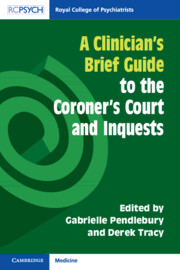People reasonably expect their healthcare professionals to avoid causing harm. In the UK, there are various clinical and governance checks and balances to ensure that the individual is safe and treated with appropriate evidence-based care, and safeguards by the state to explore and investigate when these appear to have been breached. These include internal organisational disciplinary proceedings, public complaints processes, ombudsman investigations, civil claims for compensation, and criminal prosecutions, among others. In England and Wales, the coroner’s inquest is one such check and balance.
A Unique Type of Court
The coroner’s court in England and Wales is distinct from civil and criminal courts. It is inquisitorial, finding facts that lead to a conclusion, as opposed to the adversarial model of criminal and civil courts that seek a verdict or compensation. In the criminal court, the judge’s determinations are guilty or not guilty. Civil courts decide whether a law was broken or a duty was breached. In criminal and civil courts, questioning is usually led by a barrister (counsel). However, at an inquest, the questioning is led by the coroner, who determines what has caused a death and what has contributed, more than minimally or trivially, to that death. Imprisonment or compensation are not available outcomes and there is no punishment.
The Notifications of Deaths Regulations 2019 (Regulation 3 [1]) imposes a duty on a registered medical practitioner to notify the relevant senior coroner of a death in certain prescribed circumstances (2). About half of all deaths in the UK are reported to the coroner, but not all of these lead to an inquest. If there is no doctor able to issue a certificate of death, explaining the cause of death, then it must be reported to the coroner. There are rules governing when a doctor can issue a certificate of death, they must know what illness caused the patient’s death and must have seen and treated them for that illness within the last 28 days before they died (this can include via face-to-face or video) (3). These rules are in place to safeguard patients and ensure accurate reporting and registration of death.
Even when the cause of death is known or assumed to be known, some must still always be reported to the coroner:
death linked to medical treatment or surgery;
death linked to an accident;
death linked to drugs or medication, whether prescribed or illicit;
if there is a possibility the person died by suicide;
if there are suspicious circumstances or a history of violence towards, or from, the deceased person.
Upon receiving such a report, the coroner’s office will decide on the next steps. Within the coroner’s court, there are no parties (neither defence nor prosecution as found in criminal trials, nor defendant or respondent as usual in civil cases), only ‘interested persons’ (4). There is no cross-examination, only questioning to elicit facts. There is no ‘case’ being presented.
The coroner’s court also has no set ‘procedural rules’. What this means is that the coroner (and not the interested persons) determines the process of investigation and hearings, the scope of the investigation and inquest, and which witnesses to call and which experts to instruct. The coroner may invite submissions from interested persons on these matters. In court, the coroner asks questions first of the witnesses and, although that may expose errors, it is essentially a neutral inquiry to establish the facts and understand decisions, actions and omissions that may have contributed to or prevented death. See Box 1.1 for a summary of the legislation and statutory instruments used by coroners.
Box 1.1 Legislation and Statutory Instruments used by coroners (5)
Coroners and Justice Act 2009: CJA
The Coroners (Investigations) Regulations 2013: Regs
The Coroners (Inquests) Rules 2013: Rules
The Coroners Allowances, Fees and Expenses Regulations
Human Tissue Act 2004: HTA
Notification of Deaths Regulations 2019



